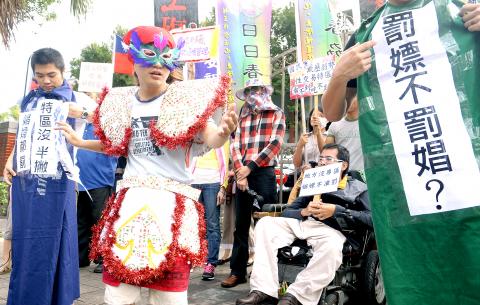The Collective of Sex Workers and Supporters (COSWAS) yesterday lashed out at both the Chinese Nationalist Party (KMT) and the Democratic Progressive Party (DPP), accusing them of reluctance to propose a real solution for sex workers as a clause in the Social Order Maintenance Act (社會秩序維護法) that penalizes sex workers is due to expire.
Declared unconstitutional by the Council of Grand Justices three years ago, a clause in the Social Order Maintenance Act that penalizes sex workers, but not their clients, will expire on Sunday.
The Cabinet has proposed amendments to the law to authorize local governments to create red-light districts where the sex trade is allowed, while it would remain banned outside those areas.

Photo: George Tsorng, Taipei Times
DPP Legislator Huang Sue-ying (黃淑英) also proposed amendments to penalize only the client, not the sex worker.
KMT Legislator Cheng Li-wun (鄭麗文) has also proposed her own law revision to totally decriminalize the sex trade. However, her proposal has not received much support from colleagues.
“The KMT said that it supports allowing the sex trade to a certain extent with appropriate management, and that’s why the Cabinet has proposed the ‘red-light district’ plan,” COSWAS executive director Chung Chun-chu (鍾君竺) told a press conference held in front of the Legislative Yuan.
“But there’s neither ‘allowing the trade to a certain extent’ nor ‘appropriate management’ in the Cabinet plan — which is supported by most KMT lawmakers — because no local government is willing to -designate red-light districts, and thus it’s a de facto complete ban on the sex trade,” Chung said.
Responding to Minister of the Interior Jiang Yi-huah’s (江宜樺) earlier remarks that the designation of red-light districts “could be discussed later after the law revision is passed,” Chung said: “Well, ‘discussing it later’ doesn’t mean anything for sex workers, because waiting for one more day means that they are not able to work and make a living for an extra day.”
Although DPP Chairperson Tsai Ing-wen (蔡英文) and the DPP caucus have criticized the Cabinet proposal, saying it would not work regardless of whether the law penalizes the prostitute or the client, or allows red-light districts, Chung said that the DPP has also failed to propose any concrete solutions.
“Both parties try to pretend that they’re open-minded and progressive, but what they do is different from what they say,” Chung said.
Although it supported complete decriminalization of the sex industry, Chung said that the COSWAS would be willing to compromise on the red-light district proposal “if a clause is added to the red-light -district deal that local governments should designate red-light districts within six months after the amendment is passed or the sex trade should remain completely legal within cities or counties where the local government fails to do so.”

Alain Robert, known as the "French Spider-Man," praised Alex Honnold as exceptionally well-prepared after the US climber completed a free solo ascent of Taipei 101 yesterday. Robert said Honnold's ascent of the 508m-tall skyscraper in just more than one-and-a-half hours without using safety ropes or equipment was a remarkable achievement. "This is my life," he said in an interview conducted in French, adding that he liked the feeling of being "on the edge of danger." The 63-year-old Frenchman climbed Taipei 101 using ropes in December 2004, taking about four hours to reach the top. On a one-to-10 scale of difficulty, Robert said Taipei 101

Nipah virus infection is to be officially listed as a category 5 notifiable infectious disease in Taiwan in March, while clinical treatment guidelines are being formulated, the Centers for Disease Control (CDC) said yesterday. With Nipah infections being reported in other countries and considering its relatively high fatality rate, the centers on Jan. 16 announced that it would be listed as a notifiable infectious disease to bolster the nation’s systematic early warning system and increase public awareness, the CDC said. Bangladesh reported four fatal cases last year in separate districts, with three linked to raw date palm sap consumption, CDC Epidemic Intelligence

US climber Alex Honnold left Taiwan this morning a day after completing a free-solo ascent of Taipei 101, a feat that drew cheers from onlookers and gained widespread international attention. Honnold yesterday scaled the 101-story skyscraper without a rope or safety harness. The climb — the highest urban free-solo ascent ever attempted — took just more than 90 minutes and was streamed live on Netflix. It was covered by major international news outlets including CNN, the New York Times, the Guardian and the Wall Street Journal. As Honnold prepared to leave Taiwan today, he attracted a crowd when he and his wife, Sanni,

Taiwanese and US defense groups are collaborating to introduce deployable, semi-autonomous manufacturing systems for drones and components in a boost to the nation’s supply chain resilience. Taiwan’s G-Tech Optroelectronics Corp subsidiary GTOC and the US’ Aerkomm Inc on Friday announced an agreement with fellow US-based Firestorm Lab to adopt the latter’s xCell, a technology featuring 3D printers fitted in 6.1m container units. The systems enable aerial platforms and parts to be produced in high volumes from dispersed nodes capable of rapid redeployment, to minimize the risk of enemy strikes and to meet field requirements, they said. Firestorm chief technology officer Ian Muceus said